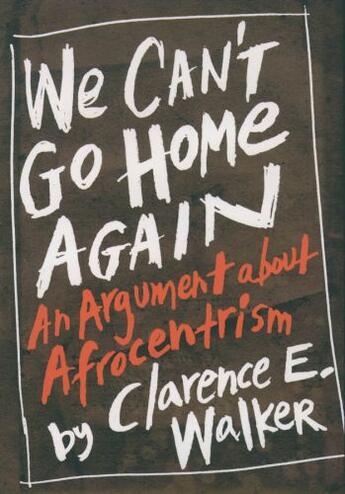-
Nombre de pages : (-)
-
Collection :
(-)
-
Genre :
(-)
-
Thème :
Non attribué
-
Prix littéraire(s) :
(-)
Résumé:
Afrocentrism has been a controversial but popular movement in schools and universities across America, as well as in black communities. But in We Can't Go Home Again, historian Clarence E. Walker puts Afrocentrism to the acid test, in a thoughtful, passionate, and often blisteringly funny... Voir plus
Afrocentrism has been a controversial but popular movement in schools and universities across America, as well as in black communities. But in We Can't Go Home Again, historian Clarence E. Walker puts Afrocentrism to the acid test, in a thoughtful, passionate, and often blisteringly funny analysis that melts away the pretensions of this "therapeutic mythology." As expounded by Molefi Kete Asante, Yosef Ben-Jochannan, and others, Afrocentrism encourages black Americans to discard their recent history, with its inescapable white presence, and to embrace instead an empowering vision of their African (specifically Egyptian) ancestors as the source of western civilization. Walker marshals a phalanx of serious scholarship to rout these ideas. He shows, for instance, that ancient Egyptian society was not black but a melange of ethnic groups, and questions whether, in any case, the pharaonic regime offers a model for blacks today, asking "if everybody was a King, who built the pyramids?" But for Walker, Afrocentrism is more than simply bad history--it substitutes a feel-good myth of the past for an attempt to grapple with the problems that still confront blacks in a racist society. The modern American black identity is the product of centuries of real history, as Africans and their descendants created new, hybrid cultures--mixing many African ethnic influences with native and European elements. Afrocentrism replaces this complex history with a dubious claim to distant glory.
"Afrocentrism offers not an empowering understanding of black Americans' past," Walker concludes, "but a pastiche of 'alien traditions' held together by simplistic fantasies." More to the point, this specious history denies to black Americans the dignity, and power, that springs from an honest understanding of their real history.
Donner votre avis














